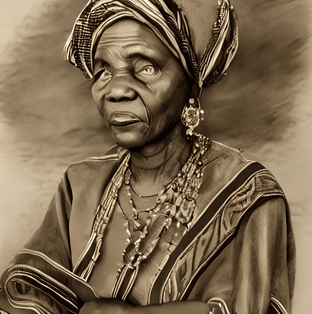
support@yorubalibrary.com
+2348073529208, 07038599574

The Yoruba society, predominantly found in southwestern Nigeria, is rich in culture and tradition, where women play significant and multi-faceted roles. Yoruba women contribute substantially to various aspects of social, economic, religious, and political life, showcasing their importance in maintaining and advancing the community.
Historical Background
Yoruba history is replete with powerful female figures who have shaped the culture and governance of their people. Notable examples include Queen Moremi of Ile Ife and Efunsetan Aniwura of Ibadan, whose leadership and bravery have left indelible marks on Yoruba history. These historical precedents highlight the longstanding tradition of influential women in Yoruba society.
Economic Contributions
Trade and Commerce
Yoruba women are known for their entrepreneurial spirit and active participation in trade and commerce. Markets, often dominated by women traders, are central to the Yoruba economy. Women, known as "Alajo," engage in various forms of trade, from selling agricultural produce to textiles and crafts. Their role in these marketplaces is crucial for the economic sustainability of their communities.
Agriculture
In rural areas, Yoruba women play significant roles in agriculture, working alongside men in farming activities. They are involved in planting, harvesting, and processing crops, contributing to food security and the local economy. Women's participation in agriculture not only supports their families but also underpins the broader economic framework of Yoruba society.
Social and Cultural Roles
Family and Kinship
Yoruba women are the cornerstone of family life. As mothers, wives, and daughters, they uphold family traditions and values. They are responsible for the upbringing and education of children, instilling cultural and moral values. The matrilineal aspect of Yoruba kinship ensures that women maintain strong ties with their maternal families, further emphasizing their role in family cohesion.
Arts and Crafts
Women in Yoruba society are also custodians of artistic traditions. They engage in various crafts, such as pottery, weaving, and beadwork, contributing to the cultural heritage and economic activities of their communities. These crafts are often passed down through generations, preserving important cultural practices.
Religious and Spiritual Influence
Priestesses and Diviners
Yoruba religion, with its pantheon of deities known as Orishas, recognizes the spiritual authority of women. Female priestesses, or "Iyalorishas," serve as intermediaries between the deities and the people. They perform rituals, offer divinations, and provide spiritual guidance, holding esteemed positions in religious hierarchies.
Rituals and Ceremonies
Women are central to the performance of various rituals and ceremonies. They play key roles in lifecycle events such as births, weddings, and funerals, ensuring that these ceremonies adhere to traditional customs. Their involvement in these practices reinforces their status as keepers of cultural and spiritual knowledge.
Political Engagement
Traditional Leadership
Yoruba women have historically held positions of power and influence within traditional political structures. The title of "Iyalode," for example, is a significant chieftaincy position held by women who act as representatives of women's interests and voices in the council of chiefs. The Iyalode wields considerable influence in community decision-making processes.
Modern Politics
In contemporary times, Yoruba women continue to break barriers in politics. They participate actively in local, state, and national governance, advocating for policies that promote gender equality and social development. Their involvement in politics ensures that women's perspectives and needs are addressed in public policies.
Education and Advocacy
Promoting Education
Education is a vital tool for empowerment, and Yoruba women have been at the forefront of advocating for educational opportunities for girls and women. Female educators and activists work tirelessly to improve access to education, reduce gender disparities, and promote literacy in their communities.
Social Advocacy
Yoruba women also engage in social advocacy, addressing issues such as women's rights, health, and economic empowerment. Organizations led by Yoruba women focus on combating gender-based violence, improving maternal health, and providing support for female entrepreneurs. Their advocacy efforts are crucial in fostering a more equitable society.
Conclusion
The role of women in Yoruba society is multifaceted and indispensable. From economic activities and family life to religious leadership and political engagement, Yoruba women contribute significantly to the vibrancy and resilience of their culture. Their efforts in education and social advocacy further highlight their importance in shaping a progressive and inclusive society. Understanding and appreciating the diverse roles of Yoruba women is essential for recognizing their contributions and ensuring their continued empowerment.

Learn about the Yoruba concept of Ìwà Pẹ̀lẹ́ (good…

Learn special praises for Divine Being and Creator…